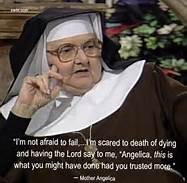 Trust is an incredibly loaded word. It is an integral aspect of our daily physical and spiritual and emotional lives, and as Catholics, we are expected to live our lives according to some aspect of trust. According to Merriam Webster’s Dictionary, trust is “the assured reliance on the character, ability, strength, or truth of someone or something and one in whom confidence is placed.” This reliance is crucial to our spiritual well-being, because without trust in God, our lives are edgy, depressed, and angry. In my view, there are three stages of trust: trust in our parents, trust in ourselves, and trust in God. As parents, we teach our children to trust us. At some point, we must trust ourselves, which is then connected to the ultimate trust in God, which reverts to our trust in our parents. It is quite a remarkable cycle but one we struggle with, nonetheless.
Trust is an incredibly loaded word. It is an integral aspect of our daily physical and spiritual and emotional lives, and as Catholics, we are expected to live our lives according to some aspect of trust. According to Merriam Webster’s Dictionary, trust is “the assured reliance on the character, ability, strength, or truth of someone or something and one in whom confidence is placed.” This reliance is crucial to our spiritual well-being, because without trust in God, our lives are edgy, depressed, and angry. In my view, there are three stages of trust: trust in our parents, trust in ourselves, and trust in God. As parents, we teach our children to trust us. At some point, we must trust ourselves, which is then connected to the ultimate trust in God, which reverts to our trust in our parents. It is quite a remarkable cycle but one we struggle with, nonetheless.
Babies cry for their needs of food and comfort. When a baby cries, the parent immediately tends to his needs. The baby learns to trust that when he or she needs something, the parent will be there with food, a clean diaper, or simply affection. What a parent teaches his child is what the child knows and trusts. My seven year old daughter often prefaces her statements with, “Mama says…” She trusts what I say and what I show her how to do. She relies on me and has faith that I will remain true to her and her needs. I have to model what I want her to believe. She trusts me, so I share my trust in God and my faithfulness to the Sacraments and my moral behavior on a consistent basis, unrelentingly, because I know she is watching.
 An adolescent seems to trust no one, however, really does revert to the child stage in which he trusts his parents. The trick is that we parents have to allow them to trust themselves and the lessons we have taught them. This self-trust is crucial to an individual’s development and the hardest step we have to take as parents. In my experience with my teenaged students, as well as with my teenaged sons, I have discovered that adolescents want rationale and reasoning– those things that go hand in hand with the free will God has bestowed upon us. Adults must allow adolescents to deduce and trust themselves and their own reasoning. We must, and this is crucial, teach them to pray for themselves as well. Asking God for grace and the guidance of the Holy Spirit, modeling what they witness as children, and the reasoning we provide for them as adults, enable young people to trust themselves and their own God-given innate morality and conscience.
An adolescent seems to trust no one, however, really does revert to the child stage in which he trusts his parents. The trick is that we parents have to allow them to trust themselves and the lessons we have taught them. This self-trust is crucial to an individual’s development and the hardest step we have to take as parents. In my experience with my teenaged students, as well as with my teenaged sons, I have discovered that adolescents want rationale and reasoning– those things that go hand in hand with the free will God has bestowed upon us. Adults must allow adolescents to deduce and trust themselves and their own reasoning. We must, and this is crucial, teach them to pray for themselves as well. Asking God for grace and the guidance of the Holy Spirit, modeling what they witness as children, and the reasoning we provide for them as adults, enable young people to trust themselves and their own God-given innate morality and conscience.
“To trust children we must first learn to trust ourselves…and most of us were taught as children that we could not be trusted” (John Holt).
We parents have to trust our children too, because in that, we model that we have trusted ourselves to have instilled the correct values according to God’s Word. We also then teach them to be trustworthy, an important virtue to possess. They will mess up; we all do, and that is okay. God calls us to be faithful, not perfect. We have to able to teach and expect our children to be faithful and faith-filled. That is our job.
 Probably the longest and most arduous stage in trust is moving away from merely trusting ourselves to steadfastly trusting in God. We constantly want our own way, but that is not what will bring us to happiness and peace. Following God’s Will for ourselves is what brings contentment and satisfaction. We have to become like a child again, leaning on our parents for guidance. We have to trust God as our father, just like we trusted our own parents: “Mama says…” I need to say to myself, several times a day, “God says…” Not only that, but God has proven to us that He is to be trusted; He sacrificed His own SON, and that son modeled trust in His father in the same way, when He said, “…yet not my will, but yours be done” (Luke 22:42). Just like the adolescent, we have to pray for grace and trust that the Holy Spirit will speak to us. We also have to not chastise ourselves too vehemently when we make mistakes, because we will make mistakes– and often. That is why we trust in the Sacraments, which are God’s outward signs that He is with us. Reconciliation and the Eucharist, in particular, remind us of the trust we have in our heavenly Father and more proof of His love and trust in us.
Probably the longest and most arduous stage in trust is moving away from merely trusting ourselves to steadfastly trusting in God. We constantly want our own way, but that is not what will bring us to happiness and peace. Following God’s Will for ourselves is what brings contentment and satisfaction. We have to become like a child again, leaning on our parents for guidance. We have to trust God as our father, just like we trusted our own parents: “Mama says…” I need to say to myself, several times a day, “God says…” Not only that, but God has proven to us that He is to be trusted; He sacrificed His own SON, and that son modeled trust in His father in the same way, when He said, “…yet not my will, but yours be done” (Luke 22:42). Just like the adolescent, we have to pray for grace and trust that the Holy Spirit will speak to us. We also have to not chastise ourselves too vehemently when we make mistakes, because we will make mistakes– and often. That is why we trust in the Sacraments, which are God’s outward signs that He is with us. Reconciliation and the Eucharist, in particular, remind us of the trust we have in our heavenly Father and more proof of His love and trust in us.
“Trust in the Lord with all your heart and lean not on your own understanding; in all your ways submit to him, and he will make your paths straight” (Proverbs 35-6).
